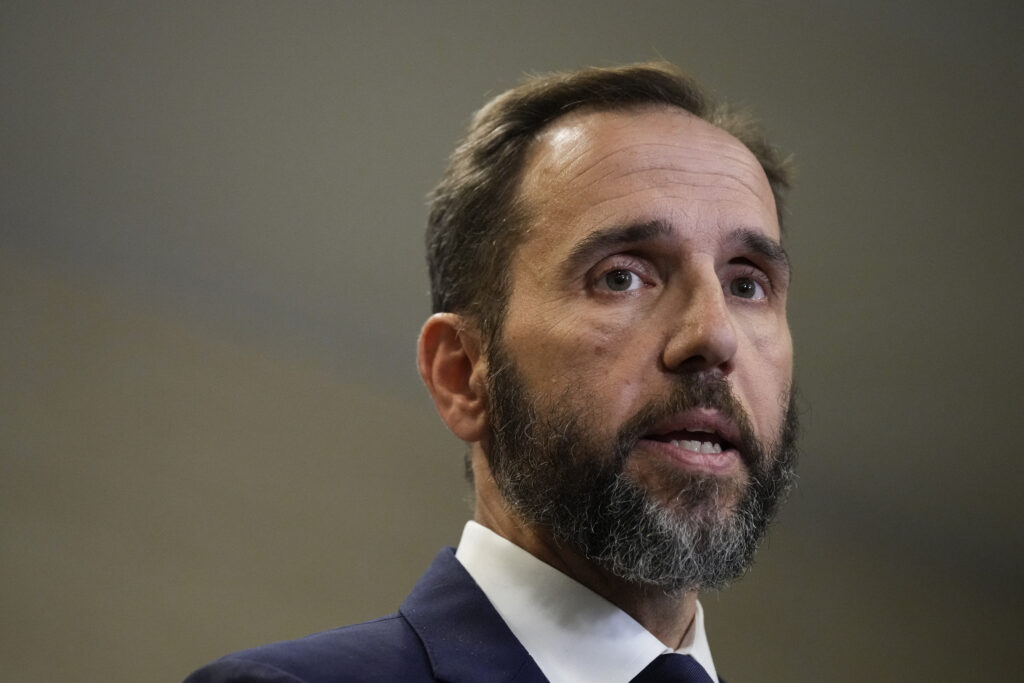Trump Mounts Last-Ditch Effort To Prevent Public From Being ‘Poisoned’ by Jack Smith’s January 6 Dossier
The 45th president wants his evidence released at the same time as that of the special counsel — after the election.

President Trump’s last-gasp effort to delay until after November’s vote the release of evidence assembled by Special Counsel Jack Smith throws into sharp relief the political stakes of the prosecution of the 45th president for election interference including on January 6, 2021. The former president is now calling for the “simultaneous” release of his evidence with that of the government.
The motion requests that Judge Tanya Chutkan delay until November 14 the unsealing of the evidence contained in the appendix of Mr. Smith’s immunity opus. That document contends that Trump “must stand trial for his private crimes as would any other citizen.” Judge Chutkan has already unsealed, with redactions, the body of that report. The supplement could contain more hitherto unseen evidence.
Trump opposed the release of the immunity motion, arguing that “the Constitution as well as the rules of criminal procedure do not permit the Special Counsel to pre-emptively defend its own lawless superseding indictment.” He traces his constitutional claim to the Sixth Amendment, which ordains that “in all criminal prosecutions, the accused shall enjoy the right to a speedy and public trial, by an impartial jury.”
The former president alleges that “without any semblance of due process—including President Trump’s right to cross-examine witnesses and call his own witnesses in a court proceeding—the public has been poisoned by a one-sided prosecutorial narrative.” That is a reference to the Constitution’s command that “in all criminal prosecutions, the accused shall enjoy the right to be confronted by the witnesses against him.”
Trump also writes Judge Chutkan that the “incumbent Vice President—whose administration the Special Counsel serves—also began featuring the Special Counsel’s brief in political advertisements for the 2024 Presidential Election.” He contends that the public release of the brief weeks before the election is evidence that the case is being bent to “political purposes by the incumbent administration.”

Trial judges are afforded wide latitude in setting the cadence for their cases. The Supreme Court has ruled that the authority to set a schedule is “incidental to the power inherent in every court to control the disposition of the causes on its docket with economy of time and effort for itself, for counsel, and for litigants.” The Nine have reckoned that the decision to delay is an “exercise of judgment” wherein a jurist “must weigh competing interests.”
Trump’s lawyers reason that if the release of Mr. Smith’s appendix is delayed until his own is docketed, “at least some press outlets will attempt to report both sides of this case, reducing (although, again, not eliminating) the potential for irreversible prejudice.” They contend that the “asymmetric releases” of the kind Judge Chutkan has ordered “would grievously harm” the public’s understanding of the case — with respect to both the ballot box and jury box.
Judge Chutkan, who has handed down harsh prison sentences to January 6 rioters, has maintained that political considerations are not legally cognizable and that they will play no role in her stewardship of the case. She also disclaims any responsibility for enforcing the Department of Justice’s own rules against election interference, which Trump claims have been violated by Attorney General Garland and Mr. Smith. The 45th president calls the immunity brief a “monstrosity” and a “false hit job.”
Trump warns that a sequential rather than a simultaneous release of evidence will harm what Justice Antonin Scalia once called the “boldness of the president.” The former president explained that if Mr. Smith, “during a highly contested political campaign, is granted leave to submit enormous filings publicly examining a President’s decision-making while in office, future Presidents will be far more reluctant to take the ‘bold and unhesitating action.’”
The citation is to the Supreme Court’s ruling in this case — Trump v. United States — where the justices determined that official presidential actions are presumptively immune from prosecution. It is that holding that Judge Chutkan is mandated to fulfill by discerning which acts in Mr. Smith’s indictment are official and which are unofficial and therefore bereft of protection.
Chief Justice Roberts’s opinion explains that the “hesitation to execute the duties of his office fearlessly and fairly that might result when a President is making decisions under ‘a pall of potential prosecution,’ raises ‘unique risks to the effective functioning of government.’” Now comes Trump to argue that a similar threat is presented when a prosecution takes shape in the midst of a fiercely contested election.
Trump’s case for a delay could be bolstered by the case’s unusual sequencing. Normally, a defendant makes motions, and then the prosecution responds. Judge Chutkan, though, granted Mr. Smith’s request to bat leadoff. Trump now worries that when his own turn comes, it will be too late.

